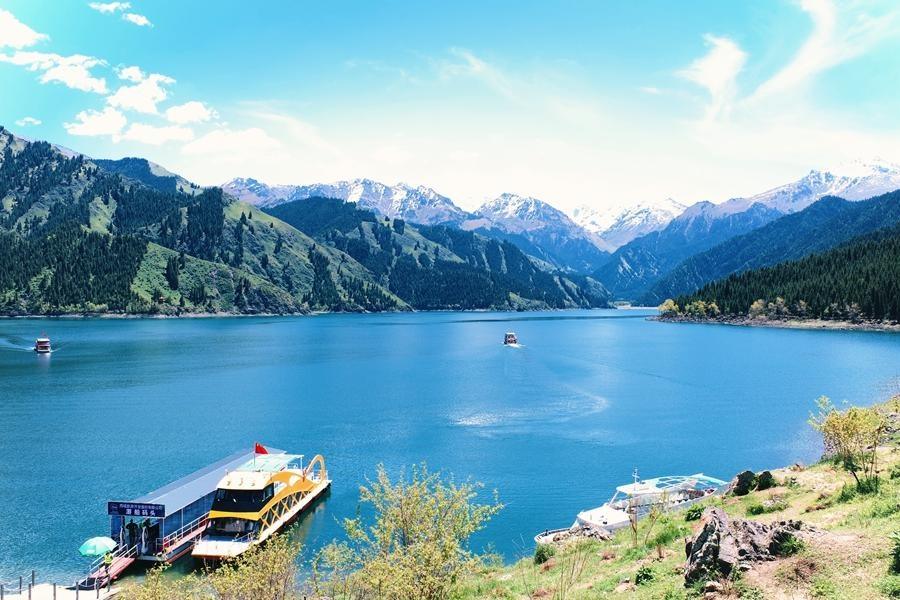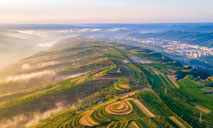Story of a Uygur tour guide in the ancient city of Kashgar
When I first met Mirsali Abduwili at the front desk of a hotel in Kashgar, I thought he was a journalist from the U.S., as he spoke fluent English. But when I looked at him more carefully, I saw that he was a Uygur tour guide.

Photo shows Mirsali Abduwili (left) talking with Walid Abdallah. (Photo courtesy of the international media tour "A Date with China")
In the following days, Abduwili took us to visit several poverty reduction and rural rejuvenation projects. The local people talked about topics ranging from livestock breeding to hydraulic engineering, which were all very technical, but Abduwili managed to translate their words into English, making communication between us and local people much easier. To my surprise, Abduwili hadn’t even been to high school, and had taught himself Mandarin and English.
The 31-year-old said he grew up in the ancient city of Kashgar, and is a witness to the changes taking place here. “When I was young, I saw a lot of foreign tourists standing at a square near the eastern gate of the ancient city, carrying large backpacks and cameras,” Abduwili recalled, adding that he was impressed by this.
Speaking only Uygur back then, the boy wanted to learn a foreign language. “My mother suggested that I learn a skill, and I said language was a skill,” he told me. But due to the lack of teachers in local schools, he couldn’t learn Mandarin until middle school, not to mention English.

Photo shows Mirsali Abduwili with his daughter and wife. (Photo courtesy of Mirsali Abduwili)
“My journey of learning English was an arduous one,” Abduwili said to me. He became an apprentice at a barber’s shop run by a person of the Han ethnic group in order to learn Mandarin, and to improve his Chinese listening skills, he often wore earphones to listen to news reports and read after the news anchors. He also went to a bar to talk with foreign tourists with the aim of learning English from them. He was so dedicated to learning languages that people around him used to think he was crazy.
Today, Abduwili is a senior tour guide, but has always felt it was a pity that he didn’t receive much of an education. To make sure his daughter had access to good education, he sent her to a private kindergarten when she was about three. “The tuition for each semester was 6,000 yuan, a little expensive but worth it, because my child could communicate in Mandarin half a year later,” he told me.
Abduwili explained that the learning environment of schools in Kashgar is completely different nowadays. “The schools are equipped with heating systems, playgrounds, and other facilities,” he told me, expressing hope that kids in Kashgar could learn Mandarin and English well so that they can boost their chances of securing a good job.
Ten years ago, I watched several documentaries about Kashgar, and found that the only means of transportation in the city was donkey. I was pretty impressed by this. But when I was in Kashgar, I saw a modern city, an international tourist destination, beautiful buildings, and a clean and cozy environment.

Photo shows Mirsali Abduwili accompanying a tour group from Germany on the Pamir Plateau, northwest China's Xinjiang Uygur Autonomous Region. (Photo courtesy of Mirsali Abduwili)
Abduwili told me that in 2007, there were no tourist buses in Kashgar, and now the transportation sector, accommodation sector, as well as tour guide services have all improved. There are at least 6 passenger transport companies in Kashgar, and several hotels are under construction.
When I asked Abduwili about the renovation project of the ancient city of Kashgar, he said that criticism of the project were the results of misunderstanding.
“I grew up in the city and I support the renovation. The buildings were built with wood, and the structures were fragile. If earthquakes or other disasters hit, the houses would be damaged, and it would be us who suffered the losses, not those people criticizing us,” he said.

Photo shows Mirsali Abduwili providing tour guide services in the ancient city of Kashgar. (Photo courtesy of Mirsali Abduwili)
He also pointed out that the purpose of the renovation was not to replace old buildings with new ones, but to seek to retain the locals’ way of life and upgrade the buildings based on preserving their original architectural styles.
For me, the practical significance of the renovation project lies in restructuring the tourism industry, as it enables people who work in the industry to operate their businesses more effectively.
The author is an editor with People's Daily Online's Arabic version.
Photos
Related Stories
- Xinjiang’s new frontier: Rural e-commerce shining bright in China's sunny northwest
- Xinjiang, My home: Ethnic Kazakh father records happy life through paintings
- Soldiers engage mock targets in ghillie suits
- Construction of first cross-desert expressway in Xinjiang proceeds smoothly
- Corban Festival celebrated in China's Xinjiang
Copyright © 2021 People's Daily Online. All Rights Reserved.










